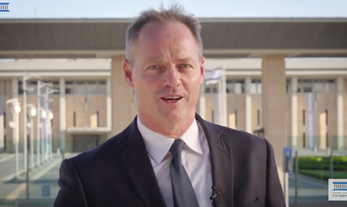

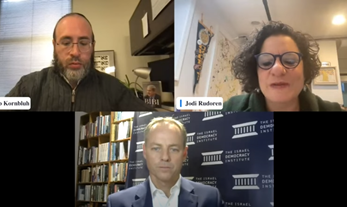
IDI - 2022 Israeli Elections Debrief
After five elections and several years of instability, Benjamin Netanyahu will soon be Israel’s prime ministership once again, backed by the most conservative coalition in the state’s history, with two far-right parties in his cabinet. What are the implications be for Israel’s judicial system, conflict with the Palestinians, international standing and relationship with the United States?
Yohanan Plesner, president of the Israel Democracy Institute, and Jacob Kornbluh, the Forward’s senior political correspondent, in conversation with Editor-in-Chief Jodi Rudoren to parse the election results and share behind-the-scenes insights about what the next government portends.
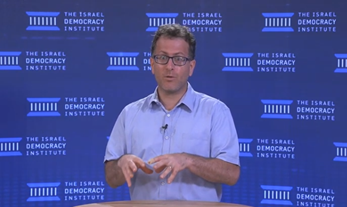
Election Results - How Are Votes Translated to Knesset Seats?
Despite a clear majority of seats in the Knesset for Netanyahu and his right-wing coalition, the number of votes cast in the 2022 elections in Israel was almost equal between the factions. How is this possible?
Israel's electoral process is one of proportional representation and includes a 3.25% threshold. Find out what role this played in determining election results and how it differs from the American electoral college system.
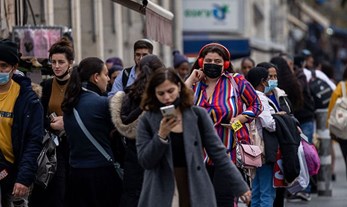
Israelis Out of Work as a Result of COVID-19
Written By: Daphna Aviram-Nitzan, Yarden Kedar
New IDI survey finds that 250,000 Israelis, who are not working, and not receiving unemployment allowances, might soon be forced to rely on supplemental income support.

The Collapsed Bridge Loan: Israel’s Shin Bet Location Tracking of Omicron Carriers
Written By: Adv. Amir Cahane
Israel reinstated contact-tracing activities by the Israel Security Agency to track carriers of the omicron variant of the coronavirus. Five days later, it halted the ISA’s contact-tracing activities, due to a lack of parliamentary support.
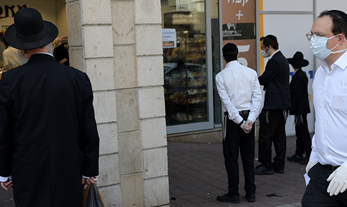
Stabilizing the Economy and Combatting COVID by Imposing Restrictions
Written By: Prof. Tamar Hermann, Dr. Or Anabi
After more than 100 days in office – Israelis want the new government to prioritize stabilizing the economy and combatting COVID by imposing restrictions on the unvaccinated

FDA Booster Decision Disappoints all Sides
Written By: Dr. Tehilla Shwartz Altshuler, Brigadier General (res.) Itai Brun
The FDA ruling regarding the Pfizer booster shot may have not been completely in-line with the Health Ministry's recommendation, but the open and transparent decision-making processes employed by the American agency holds important lessons for Israel

Why Don't We Talk to the Teachers?
Written By: Dr. Tammy Hoffman
The pandemic offers a chance for much-needed educational reform, but the hasty return is raising fears that the opportunities presented by the crisis for truly driving the education system forward into the 21st century are being missed

Using Electronic Bracelets
Written By: Dr. Tehilla Shwartz Altshuler
Electronic bracelets should be used only after restricting access to information and ensuring its security

Attention Facebook and Outbrain: Paid Content Is Now Political Ads in Israel
Written By: Dr. Tehilla Shwartz Altshuler
Israel's Central Election Committee made a landmark ruling: promoted content online - even to real news reports - is political advertising

Another Victim of the Pandemic: Our Fundamental Rights
Written By: Prof. Yuval Shany
There is no doubt that the Government has an obligation to employ meaningful measures against the pandemic, but the ease with which it was willing to infringe basic rights—is most disturbing
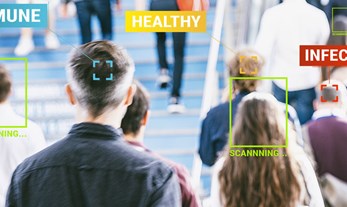
ISA Contact Tracing – Supreme Court Decision
Written By: Dr. Tehilla Shwartz Altshuler, Dr. Rachel Aridor-Hershkovitz
Israel's Supreme Court ruling on ISA's contact tracing is a reflection of the government’s decision-making processes during COVID

Israel at the Precipice: Will the March Election Bring an End to Israel’s Political and Economic Crisis?
Written By: Yohanan Plesner , Prof. Karnit Flug, Dr. Jesse Ferris
As Covid-19 continues to take Israeli lives and ravage its economy, seemingly immune to Israel’s impressive vaccination campaign, IDI President Yohanan Plesner and Professor Karnit Flug, Vice President, Research and William Davidson Senior Fellow for Economic Policy joined IDI's VP of Strategy Dr. Jesse Ferris on a JFN webinar to discuss the stakes and possible outcomes of Israel’s fourth election in less than two years.
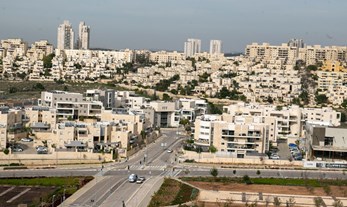
The State of Israel is Stuck in the 1980s
Written By: Dr. Ariel Finkelstein
The pandemic has brought to the fore what was already clear - the public's trust in Israel’s local government is much higher than in the central government. It is high time more authority to be transferred to the care of local leaders.

On the Fringes of Ultra-Orthodox Society
Written By: Dr. Asaf Malchi
Government agencies have not geared up to effectively address the phenomenon of marginalized ultra-Orthodox youth

COVID-19: Initial Survey Findings on Self-Employed Workers in Israel
Written By: Daphna Aviram-Nitzan, Yarden Kedar
As of the beginning of December 2020, 75% self-employed workers were working, though 45% were working only part-time. Only 29% were working the same number of hours as before the crisis.

IDI's 2020 Democracy Index: Erosion in Israelis' Assessment of Police
Israeli Democracy Index 2020 reveals sharp decline in assessment of relations between the police and the public since the outbreak of COVID-19. A majority of Israelis believe that the police does not take criticism seriously

IDI's 2020 Democracy Index: Trust in HMOs is Higher Than All Other Public Institutions
Israeli Democracy Index 2020 included a focus on Israel’s healthcare system and found higher levels of satisfaction with HMOs than with hospitals and public trust in Sick Funds is higher than in any other public institution surveyed

Israel Heads Toward Its Fourth Elections
Written By: Yohanan Plesner
After failing to meet the December 22 deadline for passing a budget, Israel is headed towards a once unfathomable fourth election in less than two years. The results of the last three elections in 2019-2020 did not dispel the political turmoil - we are about to see if the results from the fourth elections in 2021 will be any different.

Wave No. 3 is Here – We Must Learn our Lesson
Written By: Ron Tzur, Prof. Nissim Cohen
Politicians and healthcare practitioners alike must learn from their experience and formulate strategy before it is too late.

Of Whales and Members of Knesset
Written By: Prof. Yedidia Z. Stern
The real reason behind Israel's elections: The Knesset dispersed itself because one man, the prime minister, finds himself in a situation in which his fate depends on the courts.

Amendments to the Party Financing Law: A Classic Conflict of Interest
Written By: Dr. Assaf Shapira
In a classic conflict of interests, the parties dip into the public coffers before every election, flouting any semblance of fiscal responsibility

Governance in a Crisis
Written By: Prof. Nissim Cohen, Ron Tzur
The coronavirus pandemic can serve as a window of opportunity. In their new book Prof. Nissim Cohen and Ron Tzur present decision-makers a roadmap for how to better deal with crisis in Israel.

Bolstering the Health System's Capacity to Manage Crisis Situations
As part of the IDI Eli Hurvitz Conference on Economy and Society, a session was held on December 16, 2020 with the participation of Health Minister Yuli Edelstein, Director General of the Ministry of Health Prof. Chezy Levy, and a number of experts in the field of health who are responsible for preparing the health system for emergencies and crises.

2020 Eli Hurvitz Conference on Economy & Society – Recap of Day 3
The 2020 Eli Hurvitz Conference on Economy and Society concluded today following special addresses from the Alternate Prime Minister Benny Gantz and Chair of the Opposition MK Yair Lapid as well as discussions and deliberations with Minister of Health Yuli Edelstein, senior WHO and local health officials and mayors from throughout Israel.

Elections Should be Avoided
Defense Minister Benny Gantz: "Elections should be avoided, there should be a budget and a functioning government; I have no intention of replacing Avi Nissenkorn – he is doing a good job and we are committed to preserving democracy and judicial institutions."
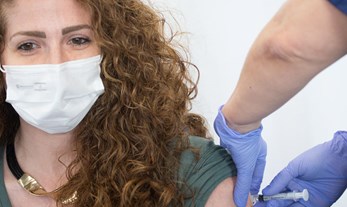
Covid-19 Vaccines – How to Encourage Public Cooperation: Explainer
Written By: Prof. Yuval Feldman
With the vaccines for Covid-19 soon to be made available and in light of the high rates of Israelis who do not want to be the first to get the vaccine - IDI expert Prof. Yuval Feldman explains how to encourage public cooperations in getting COVID-19 vaccines.

The Israeli Workforce: From Crisis to Opportunity
The labor market panel at the Israel Democracy Institute’s Eli Hurvitz Conference on Economics and Society dealt with the challenges and opportunities of the employment market in the post-Covid era.
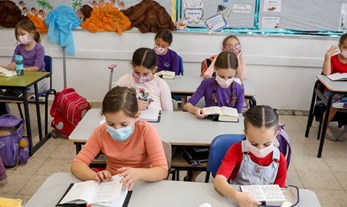
The Education System: From Crisis to Opportunity
As part of the Israel Democracy Institute’s Eli Hurvitz Conference on Economy and Society, a panel took place with the participation of Minister of Education Yoav Galant and a number of education experts, focusing on preparing the education system for the post-COVID reality. Eli Hurvitz, executive director of the Trump Foundation, served as chair of the panel.


